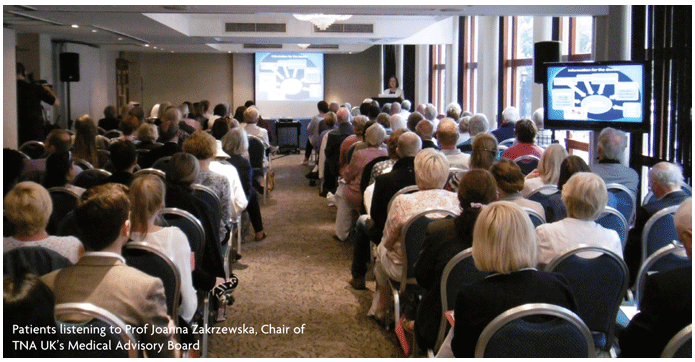
The conference was held in the Grange Hotel Holborn, London, in two adjoining rooms for patients and healthcare professionals from a wide range of different specialities: neurosurgeons, oral surgeons, specialists and physicians, plus dentists and nurses – a total of 33 specialists and 120 patients and carers in all attended this 4th joint meeting.
Professor Zakrzewska, who is the chairperson of the Medical Advisory Board of the Trigeminal Neuralgia Association UK, welcomed healthcare professionals to the meeting. The first presentation was delivered by three Trigeminal Neuralgia (TN) sufferers who had been diagnosed with different types of TN: classic, atypical and symptomatic. All had received medical and surgical treatment, the first patient, a 4th year dental student, had undergone microvascular decompression and is in remission. He is looking forward to completing his course of dental studies and being at the frontline of diagnosis to ensure no one suffers unnecessarily. He also highlighted two issues about TN:
- there are no emergency guidelines to manage severe flare-ups
- psychological management of post traumatic stress disorder related to TN and the fear of pain recurring must be part of the treatment package
Prof Zakrzewska reiterated the importance of a holistic approach as opposed to a medical management only pathway. One of the other patients highlighted how much easier it was dealing with the public when saying she had a small benign tumour rather than trigeminal neuralgia.
Prof Zakrzewska was the next presenter, discussing the need for good communication and the need to listen to patient stories. She discussed the place of narrative medicine and the use of language as well as metaphors in elucidating the characteristics of facial pain. She touched on the challenges of chronic pain, training of medical students to manage chronic pain and the need to listen to patients without interruption.
After a coffee break, Dr Deborah Padfield, a visual artist and research associate, gave her talk on images and the understanding of pain communication, the invisibility and subjectivity of pain, and how some patients can communicate their pain much better via images. She talked about various strands of her project and explained the process of producing the images with the collaboration of the patient. She illustrated this with the example of a patient photograph of an apple rotten to the core “which signified her own sensation of being decomposed”.
The next speaker was Dr Clare Daniel, Consultant Psychologist and the lead of facial pain services at the Eastman Dental Hospital.
She highlighted how unhelpful the model of pain is, incorporating as it does the concept of dualism or the mind/body split. In patients with chronic pain, psychological and sensory inputs are at work in pain processing. It is important to consider the impact of all chronic pain on physical, psychological and social aspect of patients’ lives. Clinicians must uncover patients’ beliefs about their symptoms, their future treatment goals and the investigations they think they need. Patients and clinicians must have the same model of pain and patients cannot be helped unless they develop a better understanding of their pain and its drivers.
Mr Owen Sparrow, Consultant Neurosurgeon from Southampton General Hospital, discussed posterior fossa procedures for patients with trigeminal neuralgia. There are three absolute indications for surgery: correct diagnosis, uncontrolled pain not responding to drugs and severe side-effects towards drugs. He highlighted that as well as the most conventional procedure of microvascular decompression, a non destructive procedure, neurosurgeons are also performing internal neurolysis and partial sensory rhizotomy, both of which damage the trigeminal nerve. These can have good initial success, but long term results are not as good. Neurostimulation is the latest technique to be developed.
After a joint lunch with the patients and their carers, the healthcare professionals started with a diagnostic quiz on 7 case histories, the theme being unilateral episodic facial pain. These were all patients seen by Prof Zakrzewska and she provided her diagnosis and their follow up response to her management plan. The new International Headache Classification was used and it was highlighted how little high quality evidence is available for the diagnosis of rare headache conditions. This was followed by Prof Zakrzewska reminding the audience of the lack of high quality evidence in the field of trigeminal neuralgia and providing some reasons why this is the case. She provided early results of a phase 2 trial for a new drug for TN, which has not previously been used in epilepsy. She mentioned the difficulties in recruiting patients into the study, however, early results show a positive response to the new drug.
Following afternoon tea, the healthcare professionals and patients joined together to listen to Dr Adeline Crawford, Clinical Psychologist within the facial pain services at the Eastman Dental Hospital, speaking about mindfulness. She directed the delegates to carry out mindfulness, which teaches us to be open to all emotions and not to push away those feelings we don’t like, “staying with this moment”.
The last event of the day was a question and answer session. The patients had submitted questions in writing throughout the day and these were then answered by the panel of speakers. It was also an opportunity for the Health Care Professionals (HCPs) to ask questions and get answers through a show of hands. The questions were varied, from the use of drugs and surgery to questions on the role of psychology in trigeminal neuralgia.
The evaluations were highly positive with the talks being given a high rating both for content and usefulness. Important skills that were learnt related to the practise of mindfulness and the need for improved communication in order to improve diagnostic skills. The variety of specialists present added interest and the patients’ talks where highly valued. As usual various comments re venue, visibility of slides, lack of microphones were received but these were outweighed by the positive comments. Overall a very useful Study Day that should be attended by more healthcare professionals who treat this rare disorder.
ACNR 2015;15(3):28. Online 30/07/2015
